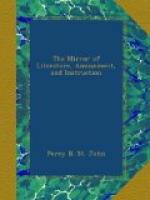The long-expected death of this good and great man took place at Abbotsford on Friday, September 21. Our seventh volume contains a Portrait and Memoir of his life to the year 1826; and it is our intention to prepare for our ensuing number, a brief memoir continued to his last days, with a wood-cut portrait from the latest painting. About twelve months since, Sir Walter wrote, with almost prophetic pen, the following passage in the introduction to his last published work: “The gentle reader is acquainted, that these are, in all probability, the last tales which it will be the lot of the author to submit to the public.” The sequel has not been so far realized, though the accordance of the closing line with the last hours of the deceased bears a consoling balm: “He is now on the eve of visiting foreign parts; a ship of war is commissioned by its royal master to carry the Author of Waverley to climates in which he may possibly obtain such a restoration of health as may serve him to spin his thread to an end in his own country.”
Eating Goose on Michaelmas Day.—Although this custom can be traced through upwards of three centuries, its origin has not been decided by antiquaries. The commonly received belief is that a goose forming part of the royal dinner when the news was brought to Queen Elizabeth of the defeat of the Spanish Armada, her chivalrous majesty commanded that the dish (a goose) then before her, might be served up on every 29th of September, to commemorate the above glorious event. Mr. Douce, the learned antiquarian illustrator, saw the above reason “somewhere” (such is his expression); but Mr. Brand thinks this rather to be a stronger proof that the custom prevailed at court in Queen Elizabeth’s time. Its origin, however, is referable to the previous century: since, bringing a goose “fit for the lord’s dinner,” on this day appears to have been customary even in the time of Edward IV.; and, that it was common before the Armada victory, is shown the following passage in Gascoigne, who died in 1577, or eleven years before the above event:—
“And when the tenauntes come to
pay their quarter’s rent,
They bring some fowle at Midsummer, a
dish of fish at Lent;
At Christmasse a capon, at Michaelmas
a goose,
And somewhat else at New Yere’s-tide,
for feare their leave flies
loose.”
The reason given by Blount, in his Tenures, is considered far from satisfactory. Beckwith, his editor, says, “Probably no other reason can be given for this custom, but that Michaelmas Day was a great festival, and geese at that time were most plentiful.” The origin of the saying that “if you eat goose on Michaelmas Day, you will never want money all the year round,” is explained, in the British Apollo, as follows:—
The custom came up from the tenants presenting
Their landlords with geese to incline
their relenting
On following payments.




